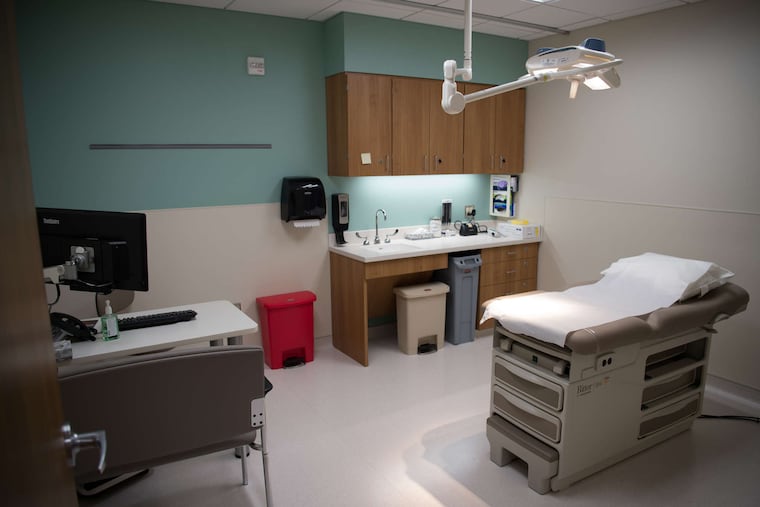A boom in suburban health care outposts
Philadelphia-area health systems and their partners are in the midst of a $700 million suburban spending spree on outpatient centers in a bid to push their front doors into the community.

Philadelphia-area health systems and their partners are in the midst of a $700 million suburban spending spree on outpatient centers in a bid to push their front doors into the community.
The latest to open, in September, was Penn Medicine Cherry Hill, a facility in which Penn invested $55 million and that is already seeing 500 patients on busy days.
In August, Nemours opened a $45 million pediatric facility in Deptford, and Main Line Health is scheduled to debut a $47 million center in Concord Township late this month.
Since 2010, local health systems have opened a dozen specialty-care centers in Philadelphia's suburbs, and at least five more are in development.
This wider distribution of health care, especially in New Jersey, has brought with it an increasing tendency for tax-exempt systems to pay property taxes, if it serves their business plans. They lease buildings to get the locations they want or to avoid tying up money in real estate and, as the lessee, are forced to pay taxes.
University of Pennsylvania Health System chief executive Ralph Muller said Penn prefers to be the owner, but property taxes are not part of the equation when Penn decides where to put an outpatient center.
"What we try to do is maximize the location in terms of patient access, and routes, and geography, and bridges, interstates," Muller said. "That's the calculus. We don't do it on the basis of whether we're paying taxes or not. If you have to pay taxes, you pay taxes."
That is the case for Penn in Cherry Hill. The owner of the former Syms store did not want to sell. Penn wanted the location close to Interstate 295 for the consolidation of three locations, so it agreed to lease. Annual real estate taxes on the facility will be more than $2 million, Cherry Hill Township officials said.
Such lease arrangements are legitimate for tax-exempt hospitals, said John D. Colombo, a professor of law emeritus at the University of Illinois College of Law and and expert on tax exemptions.
"What I think these arrangements show, however," Colombo said in an email, "is that hospitals are making decisions regarding ambulatory care centers like businesses, rather than charities."
Colombo puts it another way: "The modern nonprofit hospital is a business that provides some charitable services on the side, rather than a charity that happens to have some business on the side."
Muller said Penn's tax-exemption at facilities it owns is appropriate because of its research, education, and charity care missions. In the suburbs, Penn also pays taxes through a lease at Penn Medicine Southern Chester County, in West Grove.
CHOP last year opened three large specialty-care centers at a cost of more than $100 million. It owns the facilities in Concord Township, King of Prussia, and Plainsboro, N.J., and pays no property taxes or payments in lieu of property taxes on them.
"If a venue is something we view as a strategic imperative to the enterprise, then we want to typically own that," said Douglas E. Carney, CHOP's senior vice president for facilities and related areas.
In Haverford, CHOP recently opened a new primary-care location that it considered strategic. "We would have frankly preferred to purchase that land, but the owner was unwilling to sell," Carney said. CHOP leased it and will pay property taxes.
Virtua, South Jersey's largest health system, has generally leased its outpatient facilities because it prefers to invest in technology in its hospitals rather than in real estate, said Michael Kotzen, executive vice president for population health management.
"We have taken the approach not to try to extend that tax-exempt status where it could become fuzzy," Kotzen said.
New Jersey townships, such as Cherry Hill, are particularly vigilant about approving tax exemptions.
"Just because the umbrella organization is a nonprofit, does not mean they automatically do not pay taxes," said Cherry Hill Mayor Chuck Cahn.
Even if Penn owned the new Cherry Hill facility and got a tax exemption, the township would still ask Penn to pay for municipal services, Cahn said. Most agree to pay, he said.
Officials in Concord Township, which has had a surge in health-care investment, including a new for-profit Rothman Institute location, did not respond to interview requests.
Main Line Health owns the land and building in Concord, and does not pay taxes or make other payments, but the system has another problem, CEO Jack Lynch said
"We're going to get reimbursed under a different scenario than we we planned it for," Lynch said.
Starting in January, Medicare will no longer pay higher, hospital rates for practices owned by hospitals, unless they were established that way before November 2015.
That means, for example, the rate for a chest X-ray will drop 70 percent and a CT scan will drop as much as 79 percent.
Penn escaped the ax in Cherry Hill, as it will in Radnor, where it is planning to spend about $75 million - not counting the $35 million to buy the site - on a replacement center. Those sites were grandfathered under the old rules because Penn had existing outpatient centers nearby and could transfer the Medicare payment authorization.
The lower payments change the financial picture for freestanding specialty-care facilities.
"They'd be feasible, but the economics are less attractive than they are when they have the hospital-based payment," said Muller, of Penn.
215-854-4651
@InqBrubaker